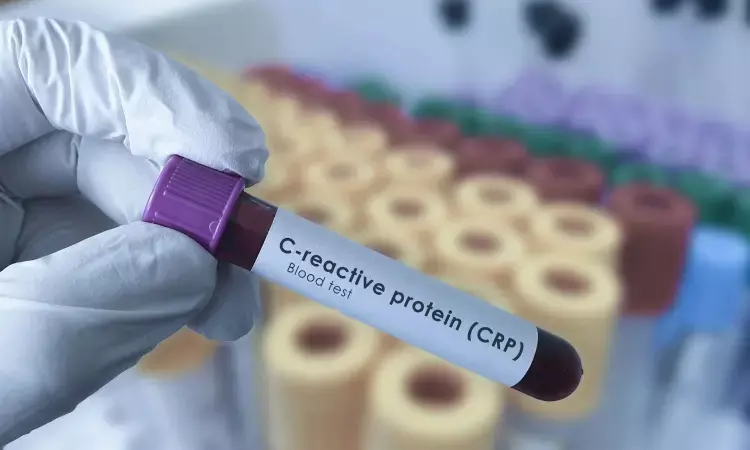- Home
- Medical news & Guidelines
- Anesthesiology
- Cardiology and CTVS
- Critical Care
- Dentistry
- Dermatology
- Diabetes and Endocrinology
- ENT
- Gastroenterology
- Medicine
- Nephrology
- Neurology
- Obstretics-Gynaecology
- Oncology
- Ophthalmology
- Orthopaedics
- Pediatrics-Neonatology
- Psychiatry
- Pulmonology
- Radiology
- Surgery
- Urology
- Laboratory Medicine
- Diet
- Nursing
- Paramedical
- Physiotherapy
- Health news
- Fact Check
- Bone Health Fact Check
- Brain Health Fact Check
- Cancer Related Fact Check
- Child Care Fact Check
- Dental and oral health fact check
- Diabetes and metabolic health fact check
- Diet and Nutrition Fact Check
- Eye and ENT Care Fact Check
- Fitness fact check
- Gut health fact check
- Heart health fact check
- Kidney health fact check
- Medical education fact check
- Men's health fact check
- Respiratory fact check
- Skin and hair care fact check
- Vaccine and Immunization fact check
- Women's health fact check
- AYUSH
- State News
- Andaman and Nicobar Islands
- Andhra Pradesh
- Arunachal Pradesh
- Assam
- Bihar
- Chandigarh
- Chattisgarh
- Dadra and Nagar Haveli
- Daman and Diu
- Delhi
- Goa
- Gujarat
- Haryana
- Himachal Pradesh
- Jammu & Kashmir
- Jharkhand
- Karnataka
- Kerala
- Ladakh
- Lakshadweep
- Madhya Pradesh
- Maharashtra
- Manipur
- Meghalaya
- Mizoram
- Nagaland
- Odisha
- Puducherry
- Punjab
- Rajasthan
- Sikkim
- Tamil Nadu
- Telangana
- Tripura
- Uttar Pradesh
- Uttrakhand
- West Bengal
- Medical Education
- Industry
C-reactive Protein-Triglyceride Glucose Index Independently Predicts Stroke Risk in Cardiovascular-Kidney-Metabolic Syndrome: Study

The study concluded that CTI not only better predicts stroke risk compared to the well-established triglyceride–glucose index (TyG), but also represents a useful risk marker among patients with CKM stage 2 and 3, where the risk of stroke events is notably high. The study was published in BMC Cardiovascular Disorders by Yinsong Xu and fellow researchers.
The data from 5767 subjects with stages 0–3 CKM syndrome participating in the China Health and Retirement Longitudinal Study (CHARLS) were examined in this study. The participants were tracked from 2011 to 2020 to examine the development of incident stroke, as diagnosed by self-reported questionnaires.
The CTI was derived from the formula:
CTI = 0.412 × ln[hs-CRP (mg/L)] + ln[(triglyceride (mg/dL) × fasting glucose (mg/dL)) / 2]
More advanced statistical techniques such as Cox proportional hazards models, restricted cubic spline (RCS) analysis, and subgroup analyses were utilized to compare associations of CTI with risk of stroke. Predictive accuracy was compared with TyG and metabolic score for insulin resistance (METS-IR) using time-dependent ROC analysis. Multiple testing correction was achieved through the false discovery rate approach to provide robustness.
Results
• After controlling for possible confounders, higher levels of CTI were significantly linked to increased risk of stroke (Hazard Ratio [HR] 1.33, 95% CI 1.18–1.51).
• RCS analysis revealed a linear relationship, without any suggestion of nonlinearity (P for nonlinearity = 0.182).
Subgroup analysis showed stage-specific effects:
• CKM Stage 2: HR 1.27, 95% CI 1.04–1.56 (P = 0.019; adjusted P = 0.023)
• CKM Stage 3: HR 1.25, 95% CI 1.04–1.50 (P = 0.022; adjusted P = 0.025)
• CKM Stages 0–1: No significant association seen
• Predictive performance analysis also revealed that CTI outperformed TyG at both year 5 and year 7 in stroke prediction consistently, with DeLong's test adjusted P = 0.028 for both contrasts.
The present nationwide cohort study supplies strong evidence that the CTI is independently and linearly related to stroke risk in CKM syndrome patients, especially at stages 2 and 3. In addition, CTI always presents higher predictive accuracy than TyG and thus has the potential to serve as an excellent clinical tool for risk stratification and early intervention in high-risk individuals.
Reference:
Xu Y, Chen S, Zhu J, et al. C-reactive protein-triglyceride glucose index and stroke risk in early cardiovascular-kidney-metabolic syndrome: a National cohort study. BMC Cardiovasc Disord. 2025;25(1):634. Published 2025 Aug 26. doi:10.1186/s12872-025-05143-3
Dr Riya Dave has completed dentistry from Gujarat University in 2022. She is a dentist and accomplished medical and scientific writer known for her commitment to bridging the gap between clinical expertise and accessible healthcare information. She has been actively involved in writing blogs related to health and wellness.
Dr Kamal Kant Kohli-MBBS, DTCD- a chest specialist with more than 30 years of practice and a flair for writing clinical articles, Dr Kamal Kant Kohli joined Medical Dialogues as a Chief Editor of Medical News. Besides writing articles, as an editor, he proofreads and verifies all the medical content published on Medical Dialogues including those coming from journals, studies,medical conferences,guidelines etc. Email: drkohli@medicaldialogues.in. Contact no. 011-43720751


